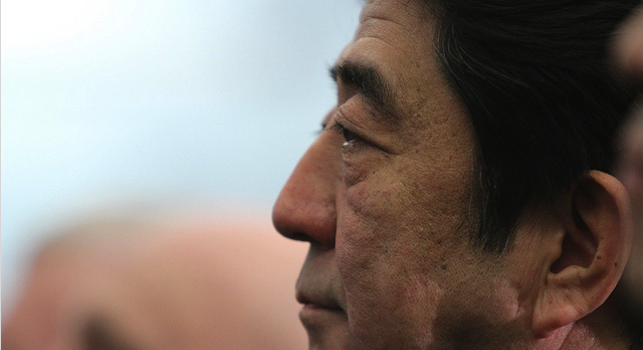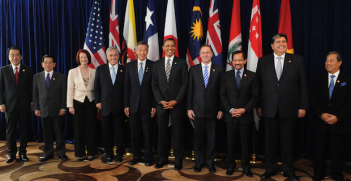Australia-Japan Cooperation: Changing Japanese Security Norms

Prime Minister Shinzō Abe has overseen a historic transformation of post-war Japan’s security policy by overturning previous interpretations of the constitution’s pacifist clause, Article 9. However, the manner in which it is being enacted may seriously undermine the normative legitimacy of Japan’s new security identity.
Domestic Japanese security norms
Japan’s security policy has long been characterised by the self-imposed constraints that surround the 1947 ‘peace constitution’ and its ‘renunciation of war’ clause, Article 9. These constraints were articulated when Japan decided to create the Self-Defence Forces, which made it necessary for the authorities to differentiate between the use of force for defensive as opposed to offensive purposes.
The self-imposed constraints specify three conditions that are designed to limit the use of force: the threat of imminent direct attack, the lack of alternative means of dealing with that threat, and, if force is used, that it should be ‘to the minimum extent possible’.
This pacifist norm has altered incrementally over the course of the post-war period to acknowledge the need for Japan to contribute to international peace and stability, particularly where its own interests are involved. This view is reflected, for example, in Japan’s post-9/11 contributions in Iraq and Afghanistan.
This norm contrasts with the companion norm of antimilitarism, which is a more complex entity that encompasses a political imperative on the part of civil society to act to prevent the state from engaging in unethical, aggressive behaviour.
The complex nature of antimilitarism comprises an entrenched distrust of the state, mainly because World War II has been rationalised in post-war Japanese civil society as primarily an act of state. For this reason, security policy in Japan can only proceed if it is widely perceived to be the product of a democratic process.
The challenge for the Abe Administration remains clear: if Japan is to transform its security policy in a manner that loosens self-imposed constraints, it must reconfigure the pacifist norm so that it facilitates rather than constrains a responsible security policy. The task is nothing less than transfiguring the pacifist norm into a security norm. To this end, the only democratic means through which security norms can be embraced by a contemporary Japanese populace is if antimilitarism is purged of democratic doubt, and newly constituted norms are produced through a democratic process.
Abe and the reconstruction of Japan’s security norms
Abe is attempting to first appropriate then reconstitute the norms that hitherto have prevented the ‘normalisation’ of Japan as a security actor. His tactics have not been subtle: a blinding pace of institutional change leading to the declaration of a new security identity of ‘proactive contribution to peace based on international cooperation’. Inevitably, this has galvanised fierce popular and parliamentary opposition from the antimilitarist constituency.
In order to justify this new direction, Abe’s argument was threefold: the constitution was no longer ‘fit for purpose’ in the current threat environment, the ‘thrust’ of the new legislation was essentially in accord with existing interpretations of the constitution (and therefore it did not need to be revised) and collective self-defence was allowable as it now could legitimately be included in the provision of ‘the use of force to the minimum extent possible’ for the purposes of self-defence.
To popularise this new identity, Abe chose to focus on what he called ‘proactive pacifism’, highlighting the need for collective forms of security. He argued that working with other nations would enhance the deterrence effect of Japan’s security arrangements and be a more efficient vector for pacifism.
This being said, Abe’s arguments were mainly met with opposition by the people. Ultimately, the Prime Minister stands accused of misusing parliamentary process and misrepresenting the will of the people; because of this, his security laws are seen to have no ethical foundation.
External norms: Australia, Japan and the USA’s ‘rebalance’ policy
It is the Obama Administration’s ‘rebalance’ policy that has provided the context both for Japan’s rush towards normalisation under Abe and for much deeper security cooperation between Japan and Australia. The main condition of this policy is that allies and partners of the USA should play a greater role not only in their own defence, but also in the achievement of the global objectives of the US alliance system. A normalised Japan is needed to achieve this, as it would enhance Japan’s cooperation with the USA, as well as with other allies such as Australia.
For Abe, the goal of an enhanced status in this alliance is partly designed to deliver greater strategic autonomy for itself while retaining the US security guarantee in its own region. That being said, it is the presence of Australia, rather than the USA, in Japan’s security orbit that lends it ethical credibility.
Japan and Australia now share a very close security partnership. The fact that Australia was a former victim of Japan’s aggression in World War II and yet was willing to engage in trust-based security cooperation with its former enemy signals exactly the kind of future-focused relationship that Abe appealed to the rest of the world to deliver. Abe’s plea to look forward was based squarely on liberal democratic values: ‘Japan will firmly uphold basic values such as freedom, democracy and human rights as unyielding values, and, by working hand in hand with countries that share such values, hoist the flag of “proactive contribution to peace”’. It is the partnership with Australia that delivers normative legitimacy to Japan’s new security identity, and enhances the quality and coherence of the alliance with the USA.
Prime Minister Abe is on the brink of achieving his lifelong political ambition of eliminating the past as a constraint on Japan’s identity and status as a post-World War II state. In order to appropriate this new normality, the Abe Administration has shattered the congruence between norms and security policy, and shaken the normative foundations of the post-war Japanese nation. Because the USA is associated in popular Japanese thinking with undermining Japan’s pure pacifist identity, there is a danger that enhancing this alliance will be further denigrated in normative terms. But it is precisely because of this negative association with the USA that the development of Australia’s security relationship with Japan is where normative rehabilitation for Japan’s new security identity may be achieved.
Australia therefore needs to be alert to Japan’s intentions and to the danger of being entrapped in Japan’s domestic normative turmoil. Neither nation can afford for this struggle over democratic legitimacy to corrode the normative legitimacy of their evolving security relationship.
Professor Rikki Kersten is Dean of the School of Arts at Murdoch University. This article is published under a Creative Commons Licence. It may be republished with permission.





